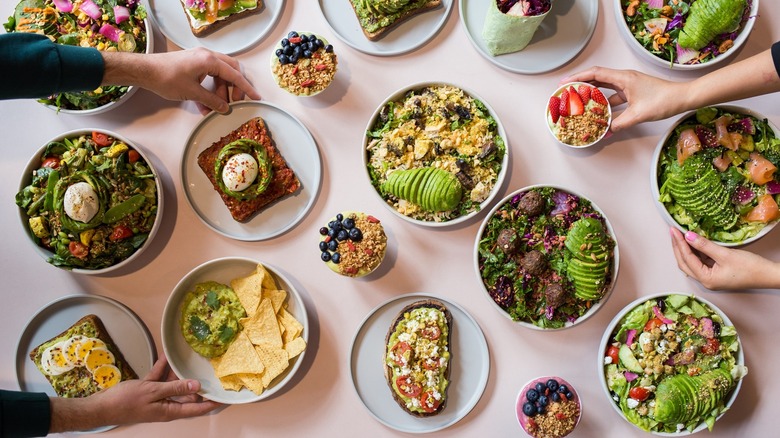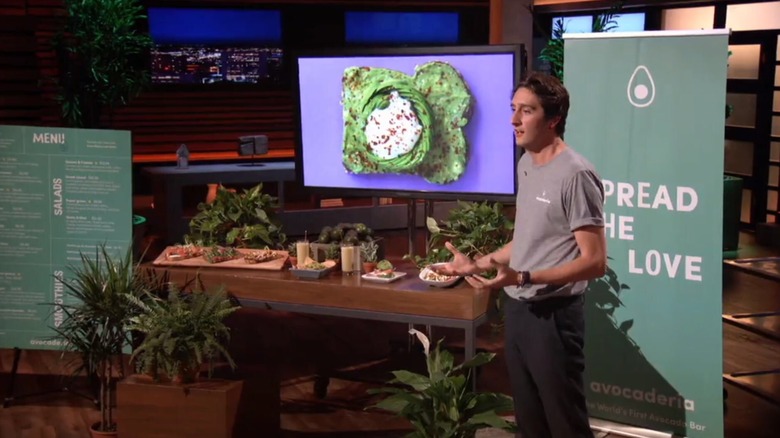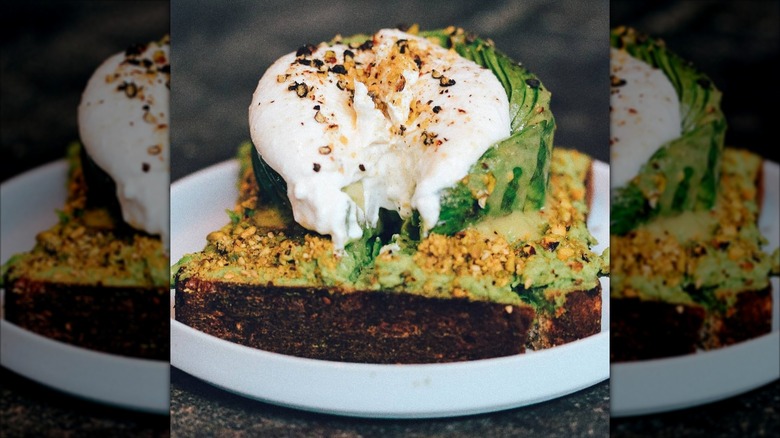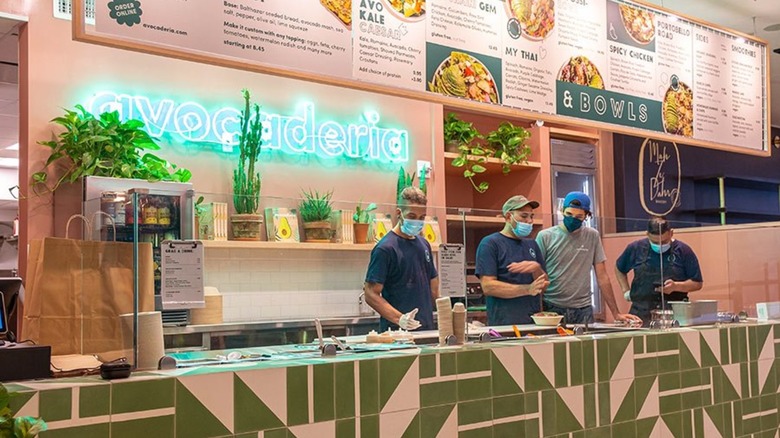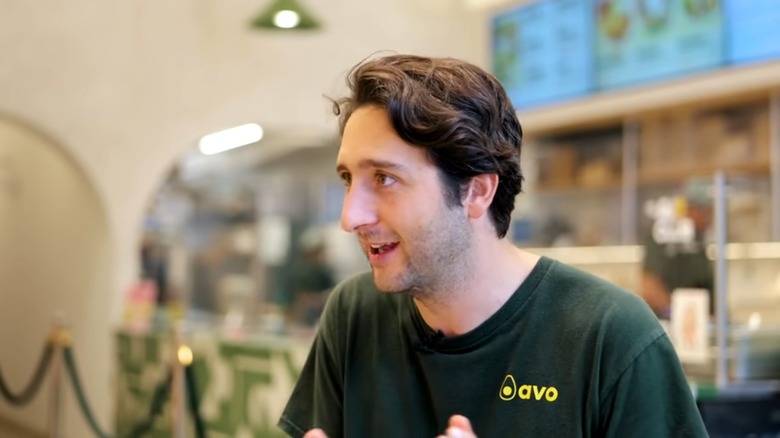Avocaderia: Here's What Happened After Appearing On Shark Tank
Living in Italy, Alessandro Biggi had never so much as tried an avocado. It wasn't until he graduated university and moved to the United States that, in a quest for something healthy and delicious to eat, he tried that most millennial of repasts: avocado toast. The rest, as they say, was history. Serendipitously, Biggi's university friend, Francesco Brachetti, had recently moved to Mexico, home of a thriving avocado industry. The pair had always talked about opening a restaurant together and, in 2017, they made it happen along with associate Alberto Gramini. A food hall in Brooklyn, New York was home to the first outlet of Avocaderia, an eatery dedicated solely to avocados, which are actually a type of fruit.
Less than a year later, everything was coming up roses (or is that avocados?) for the trio, as Avocaderia had already done $75,000 in sales. The pair had seemingly captured lightning in a bottle, having accurately gauged the public's love for all things avo. Avocaderia sold an $11.45 avocado toast among other avocado-forward dishes, and had already received a staggering 50 requests from prospective franchisees. Biggi, Brachetti, and Gramini secured a cookbook deal, which they planned on using to fund the opening of a second Avocaderia location. Things were happening fast, and they knew they needed an investor to take them to the next level, so Biggi applied to appear on "Shark Tank" and make his case.
What happened to Avocaderia on Shark Tank?
With his winsome Italian accent, Alessandro Biggi already has the sharks' attention as soon as he appeared on Season 9, Episode 22 of "Shark Tank." That attention only intensified when he shared his passionate affinity for healthy eating and presented them with samples of some of Avocaderia's wares: two kinds of avocado toast, a vegan avocado-chocolate mousse, and an avocado-mango smoothie. The assembled sharks agreed that the food was, in a word, delicious. Furthermore, Biggi emphasized that the food at Avocaderia was meant to look as great as it tasted, suggesting it would be a hit with influencers and tastemakers who liked to share snaps of pretty plates. Then, Biggi presented his ask: $300,000 in exchange for 10% equity in Avocaderia, which he valued at $3 million.
Right away, Lori Greiner stated that she wasn't particularly interested in avocados and didn't wish to continue. Robert Herjavec took issue with Biggi's valuation and dropped out as well. Rohan Oza, a guest shark known as "the Brandfather," also declined to join mission: avocado. That left Barbara Corcoran and Mark Cuban, who proposed a novel joint deal: $300,000 in exchange for 20% of the business. Biggi counter-offered, wondering if the two sharks would go for a $400,000 deal in which they each contributed $200,000 and received 10% equity. Corcoran and Cuban agreed and Biggi emerged victorious from the "Shark Tank."
Avocaderia after Shark Tank
Ultimately, despite what seemed like a promising start to their journey together, Corcoran and Cuban's deal with the Avocaderia crew never closed. This happens more often than you think on "Shark Tank," such as with the edible cutlery company IncEdible Eats, which also appeared on the show. In Avocaderia's case, the break was voluntary: Biggi stated that the team didn't want to give up too much creative control to investors. The lack of shark capital didn't slow Avocaderia down, however. Three months after their "Shark Tank" episode aired, Biggi and his partners successfully opened a second restaurant location in Chelsea. Two short hours after it opened that first day, the avocado bar was crammed with people. The Brooklyn location alone was going through 100 pounds of avocados a day and Brachetti reported working 12 to 14 hour days, seven days a week while trying to keep up with the demands of the business.
The COVID-19 pandemic was a speed bump for Avocaderia, as it was for almost all restaurants, but the team sprang into action and partnered with Operation Feed Brooklyn to provide sustenance to healthcare workers during the crisis. That good work kept Avocaderia afloat until June 2021, when the restaurants were able to officially reopen. Very swiftly after that, a third and fourth NYC location joined the fold. In February 2022, Avocaderia celebrated having passed $3 million in revenue.
Is Avocaderia still in business?
As of spring 2025, Avocaderia is very much thriving, albeit with a new name. Rechristened as "Avo," the chain pivoted from menu items revolving solely around avocados to a focus on healthy comfort food. There are five Avo locations to date, each reporting around $1 million in annual revenue. A peek at the menu reveals entrees such as chicken and salmon grain bowls, thick sandwiches, and hearty soups. Despite the fact that the namesake fruit isn't quite the focus it was, avocado is still very much present on most of the menu. And while empty seats are a restaurant red flag we can't ignore, Avo doesn't seem to have that problem. Over 63,000 folks follow it on Instagram, where the team dishes up toothsome photos of the food and quirky memes courtesy of the restaurants' social media team.
Meanwhile, customer reviews for Avo are overwhelmingly positive, with visitors raving about the veggie-forward menu and sizable portions. Avo also has its own app, and users report frequent promotions and deals that are only accessible for app users, with an interface that is user-friendly and great for custom ordering bowls. There's a lot of competition in the nutritious/delicious fast-casual category, with bigger names like Sweetgreen and Cava competing for a majority of the bowl-and-salad pie, but Avo appears to be holding its own.
What's next for Avocaderia?
Future plans for Avo include growing and thriving, according to Biggi and Brachetti. Not only do they plan to open two more New York City outlets, but they also have ambitions to expand to New Jersey, Boston, and Philadelphia. Biggi says that Avo's team has learned a lot about running a restaurant over the years, and not just the highly-relevant fact that storing guacamole with the avocado pit does not, in fact, keep it from turning brown. "We will stay close and then grow. It's an opportunity to possibly bring this type of food across the country," Biggi told the New York Post, reflecting on the philosophy that has guided them this far.
Avo's main goal is to serve healthy food that tastes good and doesn't cost too much money. That last part could get tricky, considering that they import avocados from Mexico and President Trump's proposed tariffs stand to impact every item that winds up in Mexican grocery stores, including this fruit. It's a serious issue that Avo lampooned on April Fool's Day 2025 with the tongue-in-cheek announcement of a "Tariffs Bowl" containing Mexican-imported components. Potentially-rising avocado prices notwithstanding, Avo has been steadily on the grow despite incredible odds for almost 10 years. It will be exciting to see what's next for the fast casual chain with a penchant for avocados.
